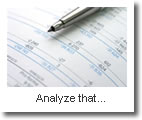Mortgage FAQ's...
Definitions:
Adjustable Rate Mortgages (ARMS): A type of mortgage loan that usually has a term of 30 years where the interest rate fluctuates and depends on a particular interest rate index. The advantage of this type of loan is that lenders typically offer initial discounts (called teaser rates) on the interest rate index making the loans less expensive than a traditional fixed rate mortgage. In addition, the loan payment goes up and down depending on the actual financial conditions of the economy which can be an advantage if interest rates remain constant or decline during the life of the loan. The disadvantage of this type of loan is that your exact payment over time is unpredictable and can increase.
Amortization: A method of retiring or liquidating a debt by making periodic and regular installment payments. Amortization is the basis for fixed rate mortgages.
Annual Percentage Rate (APR): This is the actual rate of interest your loan would be if you included all of the other associated costs such as closing costs and points.
Assumable Loans: Loans that can be transferred to a new owner if a home is sold.
Balloon Loans: A type of mortgage loan that is exactly like a traditional fixed rate mortgage except that it becomes 100% due after a specified amount of time has elapsed. When the loan matures, you must pay the loan off in cash (Balloon Payment) or refinance. The advantage of this type of loan is that the initial rate is usually lower than a normal fixed rate loan. The disadvantage of this type of loan is that you may have to refinance or pay off the loan if you do not sell the home by the time the loan matures.
BC & D Lender or Loan: The term BC & D is a rating of the loan. Similar to Moody's Rating scale for Bonds as AAA, AA, A, etc.. Generally, loans termed as A paper are for borrowers with very good credit. BC & D lenders specialty in BC & D loans. For the most part, on our web site, we refer to BC& D as "problem or troubled" credit rather than using these letters.
Buydown: The process of paying additional points on the loan to reduce the monthly mortgage. There are typically two specific types: a Permanent Buydown, and a Temporary Buydown. In a Permanent Buydown, a sufficient amount of interest is prepaid to lower the rate permanently. In a Temporary Buydown, only a sufficient interest is paid to lower the payment for the first three years. The reason to Temporarily Buydown a loan is to lower the current payments thereby more easily qualifying for the loan. This usually makes sense because income will usually continue to increase as the interest rate does. The most common Temporary Buydown is called 3-2-1, meaning three percent lower the first year, two percent lower the second year, and one percent lower the third year.
Convertible: An option available on some adjustable rate mortgages (ARM's) that allows the loan to be converted to a fixed rate mortgage. Conversion usually involves paying a one-time fee and conversion may be limited to within a certain time-frame.
Cosigner: Someone who is willing to sign a mortgage loan obligation with you in case you default on your monthly payments. Normally, the cosigner is required to go through the same application and approval process as the original signer of the loan.
Credit Report: A search through your existing credit history by a qualified credit bureau to determine if, and the number of times, you may have been delinquent making monthly payments on previous debts. Even when a credit report is for the most part positive, many lenders require written explanations for any negative comments within the credit report. This type of report is usually required to obtain a mortgage loan.
Debt Ratio: One of several financial calculations performed by your lender to determine if you can afford a particular monthly payment. The debt ratio (also known as the obligations ratio) is the sum of all of your monthly debt payments including your total monthly mortgage payment divided by your total monthly income. Typically acceptable debt ratios for Conventional Loans are 36-38%, FHA Loans are 41-43%, and VA Loans are 41%.
Discount Rate: Many lenders may offer you a lower "teaser" rate on an adjustable rate mortgage for the first adjustment period. After this period is over, the lender will adjust your loan according to the normal lenders margin rate.

